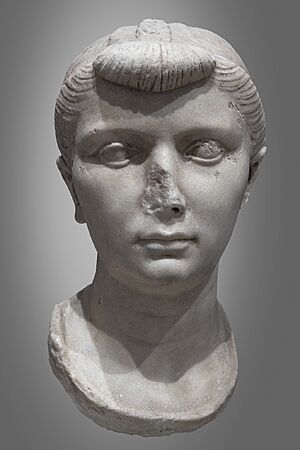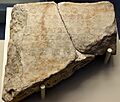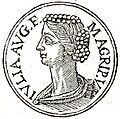Julia the Elder facts for kids
Quick facts for kids Julia the Elder |
|
|---|---|

Bust of Julia the Elder (Musée Saint-Raymond)
|
|
| Born | 30 October 39 BC Rome, Italy, Roman Republic |
| Died | AD 14 (aged 52) Rhegium, Italy, Roman Empire |
| Spouse | Marcellus (25 BC–September 23 BC; his death) Marcus Vipsanius Agrippa (21 BC–12 BC; his death Tiberius (11 BC–2 BC; divorced) |
| Issue | Gaius Caesar (Agrippa) Julia the Younger (Agrippa) Lucius Caesar (Agrippa) Agrippina the Elder (Agrippa) Agrippa Postumus (Agrippa) Tiberillus (Tiberius) |
| Dynasty | Julio-Claudian |
| Father | Augustus |
| Mother | Scribonia |
Julia the Elder was born on October 30, 39 BC, and died in AD 14. She was the only biological child of Augustus, who became the first Roman emperor. Her mother was Scribonia, Augustus's second wife.
Julia was also the stepsister and second wife of Emperor Tiberius. She was the grandmother of Emperor Caligula and Empress Agrippina the Younger. Her nickname "the Elder" helps tell her apart from her own daughter, Julia the Younger.
Contents
Julia's Early Life
Julia was born in 39 BC. At this time, her father was known as Octavian. He would later become the famous Emperor Augustus. Octavian divorced Julia's mother on the day she was born. He then took Julia to raise her himself.
Julia lived with her stepmother, Livia. Her education was very strict and traditional. She learned important skills like spinning and weaving. She also loved reading and had a good education.
Her father, Octavian, controlled her social life closely. She could only talk to people he approved of. Even with strict rules, Octavian cared deeply for his daughter. He made sure she had the best teachers available.
Julia's First Marriage
In ancient Rome, important families often arranged marriages. These marriages helped create strong alliances. Augustus wanted Julia to have sons. These grandsons could then become his heirs.
In 25 BC, when Julia was 14, she married her cousin, Marcellus. He was about three years older than her. Augustus was away fighting a war and was sick. So, Marcus Vipsanius Agrippa oversaw the wedding.
Marcellus was seen as Augustus's possible successor. This was because of his marriage to Julia and his quick rise in public roles. However, Marcellus died in September 23 BC. Julia was only 16 at the time. They did not have any children together.
Marriage to Agrippa
In 21 BC, Julia, now 18, married Marcus Vipsanius Agrippa. Agrippa was a trusted general and friend of Augustus. He was about 25 years older than Julia. This marriage was arranged by her father. It was part of Augustus's plans for his family's future.
Julia and Agrippa had five children together. Their children were Gaius Caesar, Julia the Younger, Lucius Caesar, Agrippina the Elder, and Agrippa Postumus. Agrippa Postumus was born after his father's death.
Augustus adopted Gaius and Lucius in 17 BC. He personally oversaw their education. Julia traveled with Agrippa when he was a governor in Gaul. She also joined him on a tour of the eastern provinces.
In 14 BC, Julia gave birth to Agrippina in Athens. Sadly, Agrippa died suddenly in 12 BC. Julia was pregnant at the time. She named her last son Marcus, in honor of his father.
Marriage to Tiberius
After Agrippa's death, Augustus wanted his stepson, Tiberius, to become more important. So, Tiberius married Julia in 11 BC. Tiberius had to divorce his first wife, Vipsania Agrippina, whom he loved.
Their marriage was difficult from the start. Julia and Tiberius did not get along well. The son they had together died when he was very young. By 6 BC, Julia and Tiberius had separated.
Julia's Exile
Augustus decided to send Julia away. She was sent to Pandateria, a small island. No men were allowed to visit her. She was also not allowed to drink wine. Her mother, Scribonia, went with her into exile.
Julia could only have visitors if her father approved. He even wanted to know details about the visitor's appearance. Five years later, around AD 4, Julia was moved to Rhegium on the mainland. Augustus gave her some money and allowed her to walk around town.
Despite these small freedoms, Augustus never forgave her. He never allowed her to return to Rome. Many Roman people wanted her to come back. Julia's exile was a sad part of Augustus's later years.
In AD 6, Julia's youngest son, Agrippa Postumus, was also sent away. In AD 8, her older daughter, Julia the Younger, was exiled too. Augustus was very upset by these events. He often said he wished he had never married or had children.
When Augustus died in AD 14, Tiberius became emperor. Tiberius made Julia's exile even harder. He took away her money and yearly income. He also stopped her from leaving her house or having visitors.
Julia's Death
Julia died in AD 14, shortly after Augustus. Historians believe Tiberius's harsh actions led to her death. She may have died from weakness or starvation. Augustus had clearly stated in his will that Julia should not be buried in his family tomb.
Julia's daughter, Julia the Younger, died in AD 28. She had been in exile for 20 years. Like her mother, she was not allowed to be buried in Augustus's tomb.
Julia's Marriages and Children
- 25 BC: Married Marcellus. He died in 23 BC. They had no children.
- 21 BC: Married Marcus Vipsanius Agrippa. He died in 12 BC. Their children were:
- Gaius Caesar (born 20 BC)
- Vipsania Julia, known as Julia the Younger (born around 19 BC)
- Lucius Caesar (born 17 BC)
- Vipsania Julia Agrippina, known as Agrippina the Elder (born 14 BC), who was the mother of Emperor Caligula.
- Agrippa Postumus (born 12 BC, after his father's death).
- 11 BC: Married her stepbrother Tiberius. They had one child:
- An infant son, who died very young.
See also
- Julio-Claudian family tree
- Lex Julia
- Lex Papia Poppaea
Images for kids
 | Frances Mary Albrier |
 | Whitney Young |
 | Muhammad Ali |



